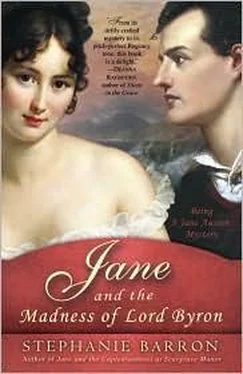And finally:
13. Who, among the respectable and the highborn of Brighton, hates Lord Byron to the point of madness ?
—The poet himself had promised to supply me with a list; but I doubted, once restored to sobriety, he should recollect the offer. I need not wait for it. The tendency of the question was this: Who hated Byron enough to make him look guilty of murder , solely in order to see him hang? In this framing of Catherine’s death, she might have been anybody—a mere convenience, as victim. General Twining, of course, had every reason to hate Lord Byron; but that should hardly urge him to murder his daughter. Mr. Hendred Smalls was capable, perhaps, of a jealous rage—but of the subsequent black joke, the hammock from the Giaour , and the sodden gift of his cherished bride in Byron’s bed? I could not think him capable; I judged him to lack the necessary subtlety of mind. Lady Oxford was brilliant enough to fashion the scheme, but had known nothing of her lover’s unfaithfulness, and was in London at the time. Caro Lamb … I had already judged Caro entirely equal to such devious ploys, and heedless enough to execute them. But if she drowned her rival, how had the body been deposited in the King’s Arms ?
My tea was cold, my fingers cramped, and my mind disordered. I thrust aside my pen in frustration, and put on my blacks for breakfast.
“IF YOU WISH TO SAUNTER DOWN TO NORTH STREET,” Henry urged over the last of his toast, “I am happy to procure a chair for your use, Jane, and even walk alongside it until the modiste is achieved. That was an excellent notion of yours, that I should frank you in a new gown; for without your kind solicitude for my health, I should never have come to Brighton at all—or engaged in so advantageous a wager.”
“It is remarkable, is it not, how unforeseen are the consequences of benevolence?” I returned. “I shall be urging you to adopt my slightest whim in future, Henry, from a desire to see you rich. But you need not accompany me to the modiste; I have been dressing myself for donkey’s years, you know.”
“Not in Brighton. Do you expect Madame La Fanchette to extend credit to a complete stranger?” He drew his purse from within his coat. “Here is a draught on my bank, Jane—if you require anything over, I daresay the woman should consent to send the bill to the Castle with her compliments.”
Fifty pounds . When Henry said my bank , he meant his bank—and the signature of the proprietor of Austen & Tilson over the draught should be all I required to win Madame La Fanchette’s confidence. But fifty pounds ? I had existed an entire twelvemonth on as much. I stared at my brother in awe; whatever one might say of the evils born of gambling, stinginess was not one of them.
“Henry—are you entirely sure—”
He gestured me away, his colour heightened. “This is nothing, Jane. Recollect that I shall not be dressing Eliza in future—who cost me four times that whenever she entered a modiste.”
We were both of us silent an instant; my throat constricted. Trust Henry to suggest that I did him a kindness by accepting of his winnings.
“Is there anything else you require of me, Jane?”
“Only to meet me at the King’s Arms for a nuncheon,” I replied recovering. “Perhaps one o’clock?”
“I should be delighted. I don’t know how it is—but even so elegant a table as the Castle’s begins to grow tiresome after several days. And you will be wanting, of course, to put your questions to the publican.”
Wise Henry.
“Or his bootboys.”
“Just so. One o’clock it is.”
He threw down his napkin and left me quite happily to my own devices—the sort of freedom that is almost never afforded me in the more crowded household at Chawton. I think I should be content to travel with Henry forever, did his luck hold out.
THERE WAS ALREADY A KNOT OF FASHIONABLE LADIES AT Madame La Fanchette’s, in North Street, all of them a little breathless from having walked hurriedly along the paving in the rain, umbrellas held high. Three of them were young matrons, consumed with talk of children and measles; one was a mamma with a young, fair-haired daughter, just out, from her looks, which were compounded of hesitancy and exuberant conceit; and the last was Mrs. Silchester.
“I cannot be so presumptuous as to go into full mourning, ” she murmured from among her floating veils, when I had greeted her, “for that is most truly the province of family , and however I may have cherished dear Catherine as another daughter—tho’ I attempted to supply her dear mother’s place—I cannot claim so near a connexion. I thought it not unpardonable, however, to put on some grey . The funeral, you know, is to be tomorrow at ten o’clock—Mr. Hendred Smalls is to lead the service—and tho’ as a lady I shall not, of course, be in attendance, I should not like to be remiss in any mark of respect on the occasion. What is your opinion, Miss Austen?”
I assured her most earnestly that grey—whether charcoal or dove—must always be unexceptionable.
“I am most partial to lavender,” Mrs. Silchester pursued doubtfully, “and cloth of silver for evening—you do not think either would offend ?”
On no account could so conservative a choice offend , I insisted—but would Mrs. Silchester prefer that I review the gowns in question?
This was officiousness in the extreme from a relative stranger; but the lady appeared to require reassurance. Her reference to Catherine Twining’s mother had recalled certain phrases of the General’s I should dearly wish explained. I determined to profit from the happy chance that had thrown us together this morning, and put my questions to Mrs. Silchester while half her mind was distracted by millinery.
Presently we were joined by Madame La Fanchette herself, a strong-featured, rail-thin woman with a pronounced Yorkshire accent who had certainly never seen Paris; her toilette, however, was the last word in elegant severity, and I imagined I should be happy in anything her workrooms might fashion for Henry’s fifty pounds. At the snap of her fingers, a bevy of young women appeared to exhibit the latest modes, all of them nicely suited to a lady of Mrs. Silchester’s station in life; Madame was familiar with her clients’ tastes.
“You will not have visited any of the warehouses,” the modiste mused, “but I may be able to supply you with a lavender silk—only observe, Miss Austen,” she said with polite acknowledgement as an assistant brought forth the bolt for my inspection, “as the weave is that fine, and the colour not too sharp.”
“It might almost be grey, in a certain light,” I admitted. “I cannot think this to be objectionable. One so dislikes to go in darker shades during the summer months—which are nearly upon us.”
“I take it you’ve recently lost a close relation,” she said, with an assessing glance at my black gown. “The workmanship is not without merit.”
“A Frenchwoman who resides in London made it for me,” I said carelessly. “Have you a clear dove sarcenet or perhaps a slate-blue twill, for Mrs. Silchester’s walking dress?”
Indeed Madame La Fanchette had; and while she discussed necklines and sleeves, and ordered her assistant to measure Mrs. Silchester’s waist, I looked on as tho’ granting opinions to an acquaintance was all the joy I required. Mrs. Silchester’s countenance, which had been suffused with anxiety, gradually relaxed under the combined ministrations of Madame and myself—there is nothing like ordering one’s clothes to lift a lady’s spirits, after all—and when at last we had arrived at the coveted cloth of silver, with a beaded hem and matching headdress, her spirits were entirely restored.
Читать дальше












